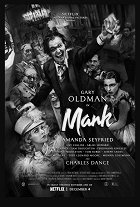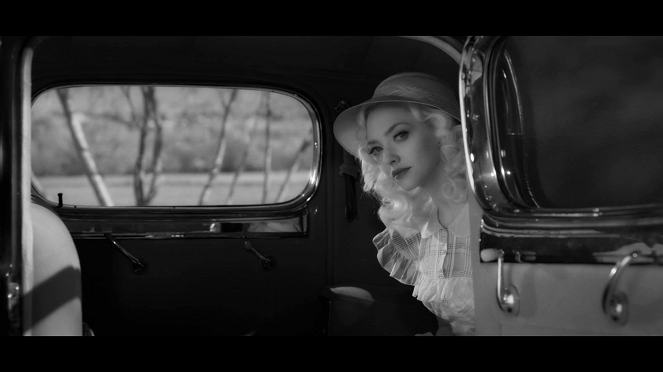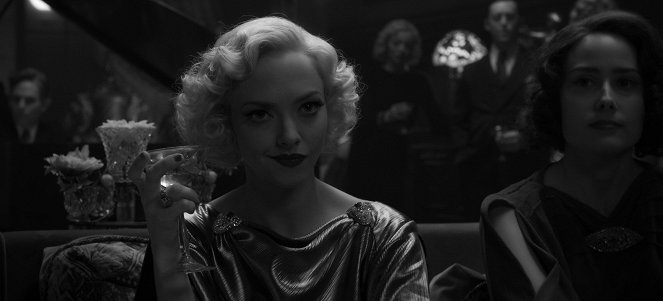Directed by:
David FincherScreenplay:
Jack FincherCinematography:
Erik MesserschmidtCast:
Gary Oldman, Amanda Seyfried, Lily Collins, Charles Dance, Tom Burke, Joseph Cross, Tuppence Middleton, Leven Rambin, Tom Pelphrey, Arliss Howard (more)VOD (1)
Plots(1)
1930s Hollywood is reevaluated through the eyes of scathing wit and alcoholic screenwriter Herman J. Mankiewicz as he races to finish Citizen Kane. (Netflix)
Videos (2)
Reviews (14)
It’s very inconsistent, I was a bit disappointed immediately after the screening, then I was writing a more extensive review, during which the film matured in me and, probably too naively, I started looking for cinephile themes and similarities or variations of Citizen Kane, only for Mank to vanish from my mind suspiciously fast a day later. I don’t mind the mythologisation of Orson Wells’s sparse participation in the screenwriting process of Citizen Kane, because I don’t take historical accuracy very much into account when evaluating a film, but it still affected my original idea regarding the coherence of the narration – though I think Fincher develops well the titular character, who in many aspects is a contrast of Charles Foster Kane (which is actually highlighted several times by the style and staging of some scenes), and provides a focused image of the time, but the individual segments feel a little haphazardly put together and don’t move the story forward much. The secondary characters are very numerous and at times it’s not clear what the author wants to say with this or that memory. Also, unlike his other films, Fincher doesn’t deliver any surprises, nor does he pull the viewer into a whirl of psychological motifs. Mank is a nostalgic retro painting that should hang at an art gallery attended only by very specific fans of period films, but it’s hanging between other new releases on Netflix, the brush strokes are clearly contemporaneous and evoke the style of the time only because they are in black and white. I respect Mank as something that brings diversity and a magical recreation of its time that irradiates love for filmmaking, and I must also admit that it didn’t bore me even for a second. I will gladly go back to it, but next time without expecting to find SOMETHING at any cost in this anticipated tribute to a great film and a difficult era (and I really tried and lied myself that that SOMETHING is there), and maybe I will be able to appreciate it from a different perspective. For the time being, though, I have to say that a couple of days ago I wouldn’t have believed that David Fincher could feel so impersonal (though still strong and beautiful to look at).
()
"WhY dOEsN’t FiNCher MaKe aNoTHeR Se7en?!?§" the movie. A work hardly applicable in a non-American environment (god, just the idea that it has Czech dubbing or subtitles in the usual Netflix quality), for which one can't be mad at Jarmila Střížkova here for absolutely not knowing where its head is at. In our confines, then, it's mainly a problem that among the mainstream cashless-market critics, there is no one who has the will to interpret and articulate the film to the local viewer, used to boredly clicking through the endless Netflix offerings in his sweatpants on the couch to see if there is anything else capable of engaging him. We all laughed at the Spáčilová until we discovered that there never was a Spáčilová, it was always just us. The absence of Mank from theaters is one of the most unfortunate things to happen this year.
()
Like Nolan, Finch this year has taken on an overwrought variation of his fetish beyond the parameters of viewer-friendly cinema. Mank is his Grand Hollywood Retro-Spectacle. Or rather his now-deceased dad, who was born during the period depicted and whose screenplay was sitting in David’s drawer, waiting for the benevolent Netflix. The enchantment of the visionary entrepreneurialism of the Hollywood studio bosses, high-society parties and debates in the opulent halls of luxury mansions, and an intimate portrait of a gifted screenwriter who was more of an outsider alcoholic despite his eccentricity and constant presence in the circles of kindred professionals. Though all of this may sound wonderful and appealing (and it’s also incredibly authentically executed cinematically), the result is problematic. Fincher interweaves the film’s world with the politics of the given setting and period, which viewers aren’t interested in, jumping around in time and between characters that he says little or nothing about and, in the dishevelled narrative, only barely manages to concentrate on the motivations of the main character, whom the whole film is supposed to be about. It is wonderfully entertaining in some individual aspects (a visit to the studios and an exterior set) and evokes a mature creative cleverness, but elsewhere it is boring with its pointlessness and empty dialogue. The character of William Hearst (Charles Dance), who was supposedly Mank’s inspiration for writing Citizen Kane, is sidelined here and no intellectual parallel is drawn between Welles’s and Fincher’s films. The moods, poses and opinions that are stuffed into this evidently artistically ambitious work will certainly please a few academics, historians, film buffs and political scientists all rolled into one, but I prefer the more narratively refined and stimulating pieces in this mold – whether the cynically intellectual (Altman’s The Player) or simply heartfelt (Burton’s Ed Wood). Of the actors, Arliss Howard comes closest to earning an Oscar for his excellent portrayal of L.B. Mayer. The walk around MGM with his emotive monologue is one of the movie scenes of the year. “This is the business where the buyer gets nothing for his money but a memory. What he bought still belongs to the man who sold it. That’s the real magic of the movies.”
()
A formally precise and linguistically exquisite picture about the writing of the screenplay for Citizen Kane. Unfortunately, apart from context of that period, it offers nothing new. Filming according to his father’s screenplay, Fincher nurtured all aspects of this heart-felt project and the way he presents the topic in the style of a forties movie is very appropriate. You can’t tell the difference. The actors are great down to the last one. The music is perfect: Reznor and Russ are brutally moderate, obediently serving the story. But it was strange to listen to Trent’s typical piano playing in a movie that clearly must have been filmed eighty years ago...
()
A sea of name dropping, perfectly executed visuals, but emotionally speaking, Mank only barely whispered to me here and there, rather than speaking to me coherently. It is the completion of a homework assignment for me and David Fincher, saved from downfall primarily by its unintentional thematic relevance.
()



Ads